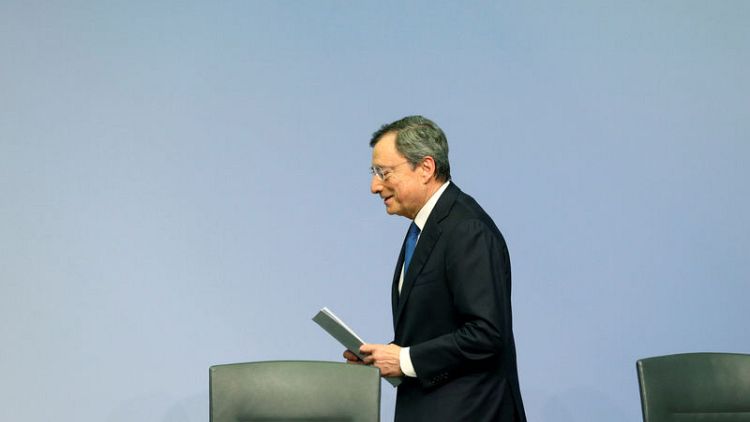By Balazs Koranyi and Francesco Canepa
FRANKFURT (Reuters) - Mario Draghi will leave a more united euro zone when he steps down as president of the European Central Bank this week, but he hands over a body more publicly divided than ever on how best to resurrect an ailing regional economy.
The 72-year-old Italian banker is widely credited with saving the euro zone from collapse, but some critics say he also overpowered opponents and tended to front-run the bank's monetary policy in public.
His approach fuelled discord that spilled into the open, critically weakening the bank's united front when it was most needed to persuade investors that it was committed to its policies.
More than a dozen current and former ECB policymakers who spoke to Reuters all agreed that Draghi is a superb central banker who deserves credit for swift action during the euro crisis of 2012, when he single-handedly saved the currency by quashing speculation against the bloc's most heavily indebted countries.
"Draghi was an inspiring leader at very difficult times," former Austrian central bank chief Ewald Nowotny told Reuters. "So this is a bit of a problematic ending to an otherwise very impressive career."
In particular, Draghi's management style sharply escalated tensions by the end of his term, some policymakers said.
They said further that creating the broadest possible consensus and making sure that the ECB speaks with one voice should be Christine Lagarde's top priorities after she takes over on Nov. 1.
Assuring investors that the bank's policies would remain consistent would provide markets with a degree of certainty, they added.
"Mario is willing to live with 50% plus one vote," said one of the policymakers, who asked not to be named. "Christine (Lagarde) needs to change this."
Draghi and the ECB declined to comment for this story. Lagarde was unavailable for comment. When asked in his last news conference as ECB president last week about the dissent over restarting bond purchases, Draghi said disagreement was unavoidable and the bank has stuck to its mandate of keeping euro zone prices stable.
"Ultimately it's the reality that speaks more strongly than any other voice," said Draghi. "It's the reality together with the conviction that we did what we did always in pursuing our mandate. If anything, that's a distinctive thing."
The most dramatic public schism occurred last month, when the ECB agreed to resume government bond purchases in an effort to kickstart fading economic growth and nudge up inflation to its target of just below 2%.
More than a third of policymakers objected, the biggest dissent Draghi faced in eight years at the head of an organization that traditionally strives for consensus.
ECB board member Sabine Lautenschlaeger quit, having unsuccessfully argued for years that the ECB's stimulus measures are excessive, possibly even stretching the bank’s mandate. She declined to comment.
The central bank chiefs of Germany, the Netherlands and Austria, who tend to favour more conservative monetary policy, all rebuked the decision to restart bond purchases, which would increase the ECB's existing 2.6 trillion euro pile of bonds.
Draghi's allies say more discussion within the ECB likely would not have changed any outcomes.
"Mario Draghi has been fulfilling his obligations very well in very difficult circumstances," Finnish central bank chief Erkki Liikanen told Reuters. "I give him my support and I'm sure history will show he was right."
DAMAGING LEAKS
The public disagreement last month, followed by damaging leaks of confidential staff opinions opposed to restarting the purchase of bonds, set off doubt among investors about the ECB's commitment to the plan.
Market-based interest rates have actually risen since the bank's rate cut in September, as some investors now doubt the bank's readiness to stick to its plan and cut rates further if necessary.
The crescendo of doubt forced French central bank chief Francois Villeroy de Galhau, who opposed the restarting of bond purchases, to make the highly unusual move two weeks ago of pledging that the September decision would be carried out in full. He declined comment for this story.
But the damage was already done.
"The noisy objections weakened confidence in our resolve, so they actually damaged the policy," one current policymaker said.
Draghi, a former Goldman Sachs and World Bank executive, already created a minor uproar in June when he stoked expectations for stimulus by tweaking the bank's policy message in a speech that caught many of his fellow rate-setters off guard, effectively pushing policy deliberations into the open and making compromise difficult.
"When one starts communicating before a meeting, others feel pushed into a corner and will want to express themselves," Belgian central bank chief Pierre Wunsch told Reuters.
"So, essentially, you have a meeting before the meeting," said Wunsch, who supported the September stimulus package.
Opponents also took objection to Draghi's practice of preparing big decisions with a close circle of advisers and involving the ECB Governing Council only late in the process.
For instance, proposals for the stimulus package were not distributed until the morning of the September meeting, primarily to prevent leaks, but leaving little time for preparation, especially as the final proposal was more ambitious than many had expected.
"If he (Draghi) sees that he has the votes, the issue is closed and we move on," one policymaker said. "He makes little attempt to find a compromise or to engage with Governing Council members who express a different view. It's a simple vote-counting exercise."
In one meeting earlier this year, Dutch central bank chief Klaas Knot confronted Draghi about the ECB's failure to raise inflation expectations, questioning whether the ECB's tools were working as intended.
According to four people present at the meeting, the testy exchange ended abruptly with Draghi telling Knot not to question a key tenet of modern central banking. The ECB, Draghi and Knot declined to comment on the incident.
A survey of the bank's staff by a trade union published last week showed most backed Draghi's policy but many resented him running the institution through a "kitchen cabinet" or "brain trust" of loyalists and "railroading through decisions."
For Lagarde, the task now is to end the public bickering and either return to decision-making by consensus or keep discord out of the media, some policymakers said.
"Choosing Madame Lagarde was a good decision because obviously what is needed now are diplomatic skills both with dealing inside the ECB and dealing with the governments," said Nowotny.
(Reporting by Balazs Koranyi and Francesco Canepa; Editing by Bill Rigby)



